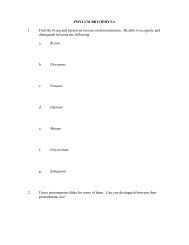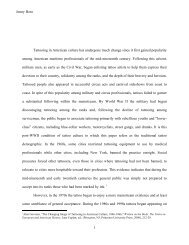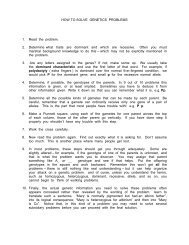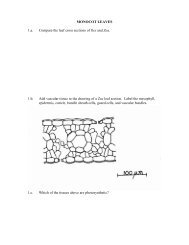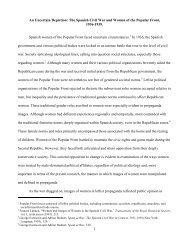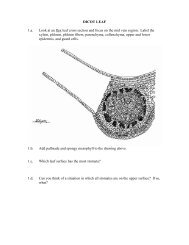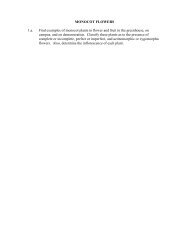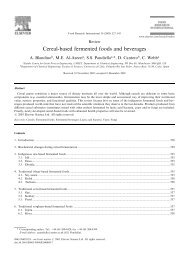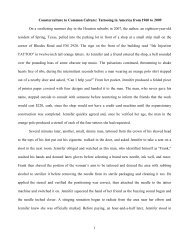Meat - Facing the Dilemmas
Meat - Facing the Dilemmas
Meat - Facing the Dilemmas
You also want an ePaper? Increase the reach of your titles
YUMPU automatically turns print PDFs into web optimized ePapers that Google loves.
The third key change is to acknowledge<strong>the</strong> intrinsic as well as <strong>the</strong> instrumentalvalue of o<strong>the</strong>r living things and systems– and to act like we mean it. We can callthis ‘earth ethics’. Earth ethics tells us that<strong>the</strong> ultimate source and measure of valueis not ourselves, and certainly not oureconomic systems, but <strong>the</strong> bigger contextof which we are a part – <strong>the</strong> earthitself on which we, and our economies,inescapably depend. We are, in effect, partof a community and for it to continueworking, and <strong>the</strong> members of it flourish,we need to act accordingly. A pragmaticsensitivity towards o<strong>the</strong>rs in <strong>the</strong> face ofinterdependence and a deep respect foro<strong>the</strong>rs in <strong>the</strong>ir own right are implied by<strong>the</strong> community metaphor.More of <strong>the</strong> same only louderSo what about <strong>the</strong> argument that fur<strong>the</strong>rintensification of animal based agriculturewill be a necessary part of our responseto climate change? Is climate change sourgent animal welfare becomes a luxurywe simply cannot afford?Leaving aside <strong>the</strong> highly contestedquestion of whe<strong>the</strong>r fur<strong>the</strong>rintensification and <strong>the</strong> correlativecontinued high dependence on fossil fuelbased energy will actually enable us toreduce our carbon footprint, it shouldalready be clear why this suggestion isso profoundly mistaken. The worldviewand ethics identified as contributingto environmental collapse are exactly<strong>the</strong> same as those underpinning <strong>the</strong>problematic treatment of animals inintensive farm systems.Like any major industry, <strong>the</strong> primarygoal of modern livestock systems is tomaximise profit. One way to do this isthrough economies of scale – makingfarms larger and keeping more animalson <strong>the</strong>m, managed by fewer people. If <strong>the</strong>animals are confined, less of <strong>the</strong> food fedto <strong>the</strong>m is ‘wasted’ by <strong>the</strong> animal movingaround, and more is turned into meator eggs. The result is highly mechanised,industrial-scale systems that keepenormous numbers of animals in confinedsituations. Attendant animal welfare issuesinclude severe reduction in behaviouralrepertoires, boredom, stress, socialdeprivation or social crowding, high levelsof surgical and drug based interventions,stereotypical behaviours, and o<strong>the</strong>r ‘vices’such as tail biting, as well as pain andfear. These problems are not caused byindividual farmers, but are <strong>the</strong> inbuilt logicof <strong>the</strong> system that so many farmers arenow part of.Animals in <strong>the</strong>se systems are viewed andtreated as components in a productionline. They are part of a process that aimsto turn animal feed into human foodas efficiently as possible. ‘Advances’ inmodern farming methods mean we nolonger have to understand and respectanimals as sentient living beings to achievethis. The underlying ethic of this kindof farming endorses this treatment ofanimals as commodities or things ra<strong>the</strong>rthan as living, feeling, experiencing beings.So <strong>the</strong> treatment of o<strong>the</strong>r animals ando<strong>the</strong>r living things purely as humanresources, as things or products, is at <strong>the</strong>heart of both problems – environmentaland animal welfare. And, as Einstein said,you can’t fix a problem with <strong>the</strong> samekind of thinking that caused it. Dealingwith climate change by bringing aboutmore of <strong>the</strong> same can never work.Intensifying agriculture as a response toclimate change cannot be <strong>the</strong> solution. Itis as if, having learned that a loud noiseis making us deaf, we respond by turning<strong>the</strong> sound up even higher.Big bold solutionsThe wake-up calls of climate change,<strong>the</strong> accelerated extinction of our fellowspecies and systematically poor levelsof animal welfare have a shared rootcause in <strong>the</strong> mindset that sees o<strong>the</strong>rsin purely instrumental terms as a set ofresources for humans, and ourselves asdetached and separate managers of <strong>the</strong>seresources. These issues are all connectedand cannot be tackled separately. To take<strong>the</strong>m toge<strong>the</strong>r is to see that industrialisedsocieties are heading in <strong>the</strong> wrongdirection and that profound changes areneeded.Farming is both implicated in this andstrongly positioned to show <strong>the</strong> wayforward. Farming affects all of <strong>the</strong>seissues. And we all have a stake in itsfuture. What sort of farming with whatsort of ethics, underpinned by what sortof worldview, do we want? One that leadstowards ecological disaster or one thatleads us towards a saner, healthier, fairerfuture for all? The general answer is clear.To get <strong>the</strong>re, we need to understandourselves as members of a livingecological community in which o<strong>the</strong>rs aretreated with respect. This does not meantreating <strong>the</strong>m as sacrosanct and unusablebut it does mean treating animals assentient beings with social, behaviouraland o<strong>the</strong>r needs, and it does meanworking with <strong>the</strong> grain of living systemsra<strong>the</strong>r than against, ensuring that farmingis compatible with biodiversity andminimising its climate change impact.What this means in practice is beingworked out by some of <strong>the</strong> farmersand researchers contributing to thismagazine, and many o<strong>the</strong>rs. Onerepeated conclusion is that, overall, <strong>the</strong>world’s farming needs to involve feweranimals, leading a higher quality of life.This apparently goes against consumerdemand. We are told that consumerswant more, cheaper meat. But we alsoknow that this is not compatible with asustainable future in any sense of thatphrase. Consumers as citizens clearly dowant <strong>the</strong>re to be such a future. Sooneror later this will be translated intomarket demand. Farming is compelledby business imperatives but in addition itcan and should demonstrate leadershiphere – ethical and sustainable leadership.It should promote agricultural systemsbased on respect for o<strong>the</strong>r forms of lifebecause that is <strong>the</strong> right ethic, and alsobecause we need to think like that tocontinue our tenancy on <strong>the</strong> planet.And farming can help us experience aswell as know what this means. We canintellectualise ourselves into a betterenvironmental ethic only so far. Weneed to feel it too. Modern ways ofliving leave us feeling disconnected fromecological systems and o<strong>the</strong>r forms oflife. Anyone who has been involved in <strong>the</strong>husbandry of fulfilled animals on farmsthat co-exist with a rich diversity of wildspecies knows how truly and powerfullyfarming can reconnect us with meaningful,sustainable and ethical ways of makingour living on this, one, earth.1 This article is based on a chapter in The future of animalfarming, edited by Marian Stamp Dawkins and RolandBonney, to be published by Blackwell in 2008.1. UNEP (2007) Global Environment Outlook 4. MillenniumEcosystem Assessment (2005) www.millenniumassessment.org.2 Steinfeld, H. et al. (2006) Livestock’s long shadow. FAO.3 Rowlatt, J. (2007) Meet daisy <strong>the</strong> cow – global climate’senemy number one. www.bbc.co.uk.4 WWF (2004) Living planet report. WWF.5 Henson, R. (2006) The rough guide to climate change.Rough Guides Ltd.6 HRH The Prince of Wales (2007) A sense of harmony.Resurgence 242.7 Anderson, R. (2007) Mid-course correction.Resurgence 242.www.foodethicscouncil.org | Volume 2 Issue 4 | Winter 2007 15



